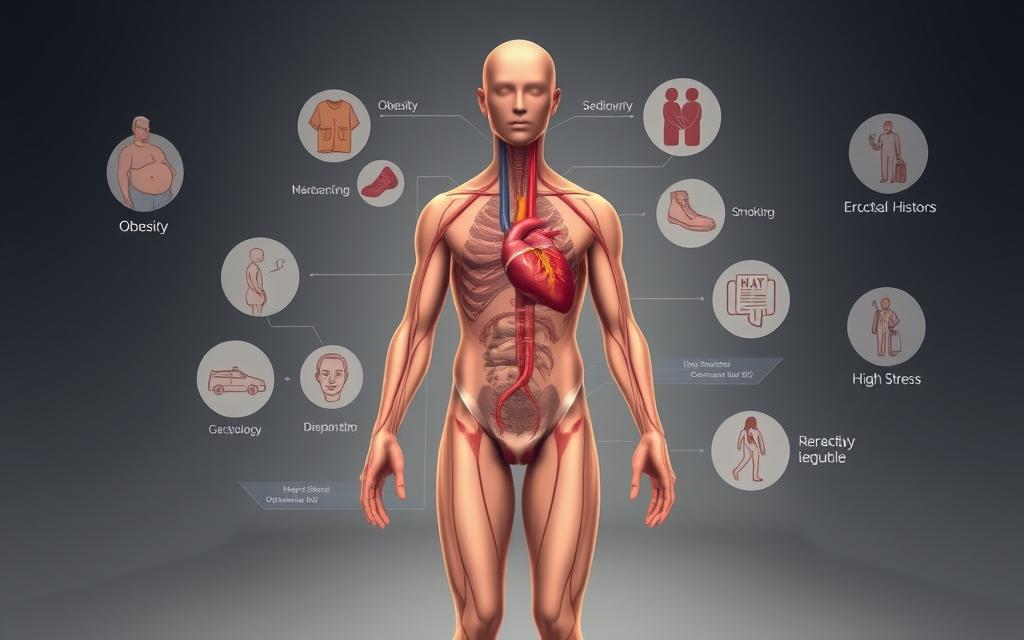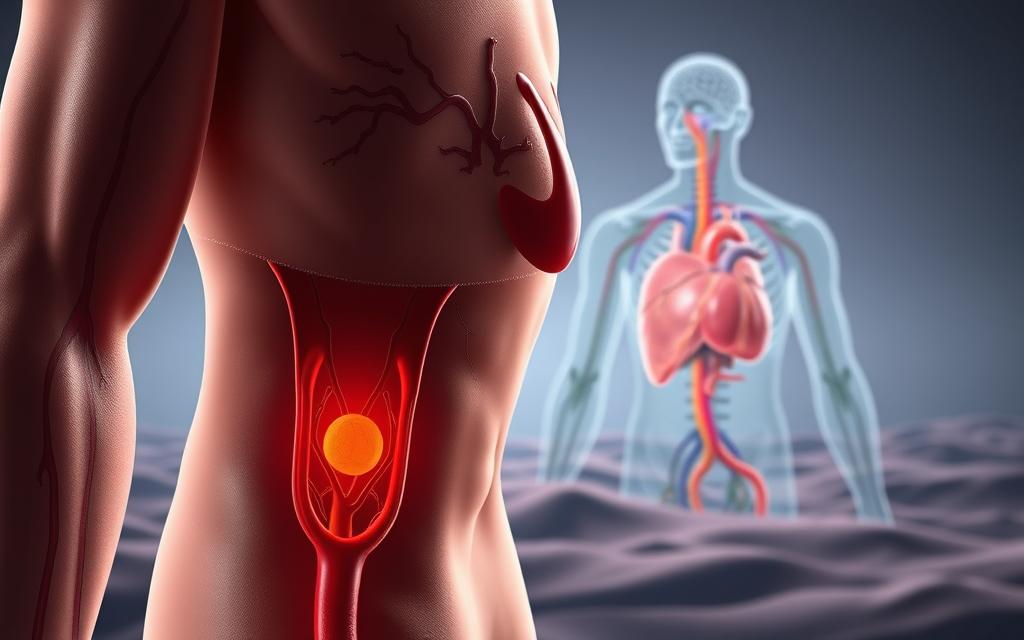High Blood Pressure Contributes to Erectile Dysfunction: Causes & Solutions
Understanding the link between hypertension and sexual health is crucial for overall well-being. High blood pressure is a significant health concern that affects millions of people worldwide, and its impact on sexual health cannot be overlooked.
Erectile dysfunction is a condition that can be triggered by various factors, including high blood pressure. The relationship between the two conditions is complex, and addressing erectile dysfunction requires understanding its underlying causes.
By exploring the causes and available solutions, individuals can take the first step towards managing their condition and improving their sexual health. This article aims to provide insights into the relationship between hypertension and erectile dysfunction, offering a comprehensive overview of the topic.
The Connection Between High Blood Pressure and Sexual Health
High blood pressure and sexual health are closely linked, with cardiovascular health playing a significant role in sexual function. Understanding this connection is crucial for addressing the challenges that come with both conditions.
Understanding the Prevalence of Both Conditions
Both high blood pressure and erectile dysfunction are prevalent health issues. Hypertension affects millions of adults worldwide, and erectile dysfunction is a common condition among men, particularly as they age. The co-occurrence of these conditions is not coincidental; they share common risk factors and underlying physiological mechanisms.
How Cardiovascular Health Affects Sexual Function
Cardiovascular health is fundamental to maintaining healthy sexual function. The ability to achieve and maintain an erection depends on the proper functioning of blood vessels, which can be compromised by hypertension. When blood vessels are damaged, blood flow to the penis can be reduced, leading to erectile dysfunction.
The Impact on Quality of Life
The interplay between high blood pressure and sexual dysfunction can significantly impact an individual’s quality of life. Beyond the physical aspects, these conditions can affect mental health, leading to anxiety, depression, and strain on personal relationships. Addressing both conditions simultaneously is essential for improving overall well-being.
By understanding the link between cardiovascular health and sexual function, individuals can take proactive steps to manage their health and improve their quality of life. This involves adopting a holistic approach that includes lifestyle modifications, medical treatment when necessary, and open communication with healthcare providers.
Blood Pressure Erectile Dysfunction: The Physiological Link
Understanding the physiological link between hypertension and erectile dysfunction requires a deep dive into the vascular mechanics that facilitate healthy erections. The relationship between blood pressure and erectile function is complex, involving multiple physiological pathways.
The Vascular Mechanics of Healthy Erections
A healthy erection is primarily a vascular event, relying on the intricate balance between arterial blood flow, venous occlusion, and sinusoidal relaxation within the penile corpora cavernosa. Vascular mechanics play a crucial role, as the increase in blood flow into the penis, coupled with the compression of venous outflow, results in an erection.
How Hypertension Damages Blood Vessels
Hypertension damages blood vessels in several ways, including promoting atherosclerosis, enhancing vascular stiffness, and impairing endothelial function. These changes reduce blood flow to the penis, making it difficult to achieve or maintain an erection.
| Effect of Hypertension | Impact on Erection |
|---|---|
| Atherosclerosis | Reduced blood flow to the penis |
| Vascular Stiffness | Impaired ability to achieve erection |
| Endothelial Dysfunction | Decreased nitric oxide production, crucial for erection |
Endothelial Dysfunction as the Common Denominator
Endothelial dysfunction is a key factor linking hypertension and erectile dysfunction. The endothelium plays a critical role in vascular health by regulating blood flow and blood pressure. In hypertension, endothelial dysfunction leads to decreased production of nitric oxide, a crucial molecule for achieving an erection.
In conclusion, the physiological link between blood pressure and erectile dysfunction is deeply rooted in vascular health. Understanding this connection is crucial for developing effective treatment strategies that address both conditions simultaneously.
Common Risk Factors That Contribute to Both Conditions
Understanding the shared risk factors between high blood pressure and erectile dysfunction is crucial for managing both conditions effectively. Several factors contribute to the development and exacerbation of these health issues.
Age and Hormonal Changes
As men age, the risk of developing both high blood pressure and erectile dysfunction increases. Hormonal changes, particularly the decline in testosterone levels, play a significant role in this process. Lower testosterone levels can affect erectile function, while also potentially influencing blood pressure.
Obesity and Metabolic Syndrome
Obesity and metabolic syndrome are significant risk factors for both conditions. These factors are associated with insulin resistance, inflammation, and vascular dysfunction, all of which can contribute to high blood pressure and erectile dysfunction.

Smoking, Alcohol, and Other Lifestyle Factors
Lifestyle factors such as smoking and excessive alcohol consumption can significantly impact both conditions. Smoking damages blood vessels, reducing blood flow and increasing blood pressure, while excessive alcohol consumption can lead to hypertension and negatively affect erectile function.
Addressing these common risk factors is essential for mitigating the risks associated with high blood pressure and erectile dysfunction. By making informed lifestyle choices and managing health conditions effectively, individuals can reduce their risk of developing these conditions.
Blood Pressure Medications That May Worsen ED
Blood pressure medications are crucial for cardiovascular health, yet some can exacerbate erectile dysfunction. Managing hypertension is vital, but it’s equally important to consider the potential sexual side effects of certain treatments.
Beta Blockers and Their Sexual Side Effects
Beta blockers are a common treatment for high blood pressure. However, they have been associated with sexual side effects, including erectile dysfunction. The exact mechanism is not fully understood, but it’s believed that beta blockers can reduce blood flow to the penis, making it harder to achieve an erection.
Diuretics and Their Impact on Sexual Function
Diuretics, another type of blood pressure medication, can also impact sexual health. By increasing urine production, diuretics can lead to dehydration if not managed properly. Dehydration can reduce blood volume, potentially worsening erectile dysfunction.
Alternative Medications With Fewer Sexual Side Effects
Fortunately, not all blood pressure medications have the same sexual side effects. ACE inhibitors and calcium channel blockers are examples of alternatives that may have fewer impacts on erectile function. These medications work differently and can be more suitable for men concerned about ED.
| Medication Type | Impact on ED | Example Medications |
|---|---|---|
| Beta Blockers | May worsen ED | Propranolol, Metoprolol |
| Diuretics | Potential to worsen ED if dehydration occurs | Hydrochlorothiazide, Furosemide |
| ACE Inhibitors | Fewer sexual side effects | Lisinopril, Enalapril |
| Calcium Channel Blockers | Fewer sexual side effects | Amlodipine, Verapamil |
It’s essential for patients to discuss their medication regimen with their healthcare provider to find the best balance between managing blood pressure and maintaining sexual health.
Diagnosing Both Conditions Effectively
A thorough diagnostic process is essential for identifying the interplay between hypertension and erectile dysfunction. Accurate diagnosis is the foundation upon which effective treatment plans are built.
Comprehensive Blood Pressure Testing
Comprehensive blood pressure testing involves more than just a single measurement. It includes ambulatory blood pressure monitoring to track blood pressure over 24 hours, providing a clearer picture of blood pressure patterns. This helps in diagnosing hypertension and assessing its severity.
Evaluating Erectile Dysfunction: Tests and Assessments
Evaluating erectile dysfunction involves a range of tests and assessments. These may include medical history reviews, physical examinations, and laboratory tests to check for underlying conditions that could be contributing to erectile dysfunction.
Identifying the Relationship Between Your Symptoms
Identifying the relationship between symptoms of high blood pressure and erectile dysfunction is crucial. Healthcare providers look for common underlying factors and assess how these conditions interact. This holistic approach helps in developing a treatment plan that addresses both conditions effectively.
Medical Treatments for ED in Hypertensive Patients
Managing erectile dysfunction (ED) in patients with hypertension requires a careful consideration of treatment options.
Hypertension and erectile dysfunction often coexist, and treating one condition can impact the other. The primary goal is to identify treatments that are both effective for ED and safe for patients with high blood pressure.
PDE5 Inhibitors: Safety and Efficacy With High Blood Pressure
PDE5 inhibitors, such as sildenafil (Viagra), tadalafil (Cialis), and vardenafil (Levitra), are commonly prescribed for ED. These medications work by enhancing the effects of nitric oxide, a natural chemical the body produces that relaxes muscles in the penis, increasing blood flow.
Studies have shown that PDE5 inhibitors are generally safe for men with hypertension, including those taking antihypertensive medications. However, caution is advised, especially for patients on complex antihypertensive regimens.
Other ED Treatments Compatible With Hypertension
In addition to PDE5 inhibitors, other treatment options are available for ED in hypertensive patients. These include alprostadil, a prostaglandin E1 analogue that can be administered via injection or as a suppository, and vacuum erection devices.
For some patients, combination therapy may be considered, where PDE5 inhibitors are used alongside other treatments to enhance efficacy.
Managing Medication Interactions and Side Effects
A critical aspect of treating ED in hypertensive patients is managing potential medication interactions. PDE5 inhibitors, for example, can interact with nitrates, leading to a significant drop in blood pressure.
- Monitor blood pressure regularly.
- Adjust dosages of antihypertensive medications as necessary.
- Consider alternative ED treatments if PDE5 inhibitors are not tolerated.
By carefully selecting and monitoring treatment, healthcare providers can help hypertensive patients manage ED effectively while minimizing risks.
Lifestyle Modifications That Improve Both Conditions
Making simple yet effective lifestyle changes can have a profound impact on managing hypertension and erectile dysfunction. By adopting healthier habits, individuals can significantly improve their overall cardiovascular health and sexual function.
The DASH Diet for Hypertension and Sexual Health
The DASH diet, which stands for Dietary Approaches to Stop Hypertension, is a well-studied eating plan that has been shown to help lower blood pressure. It focuses on consuming fruits, vegetables, whole grains, lean proteins, and low-fat dairy products. This diet is rich in nutrients and antioxidants that not only help manage hypertension but also support overall sexual health.
Key components of the DASH diet include:
- High intake of fruits and vegetables
- Consumption of whole grains
- Inclusion of lean protein sources
- Low-fat dairy products
Exercise Regimens That Benefit Blood Flow and Erectile Function
Regular physical activity is crucial for maintaining healthy blood flow, which is essential for erectile function. Exercise regimens such as aerobic exercises, strength training, and flexibility exercises can help improve cardiovascular health and reduce the risk of erectile dysfunction.
| Exercise Type | Benefits |
|---|---|
| Aerobic Exercises (e.g., walking, cycling) | Improves cardiovascular health, enhances blood flow |
| Strength Training | Builds muscle, improves overall health |
| Flexibility Exercises (e.g., yoga) | Enhances flexibility, reduces stress |
Weight Management Strategies for Better Blood Pressure and Sexual Health
Weight management is a critical aspect of managing both hypertension and erectile dysfunction. Maintaining a healthy weight reduces the strain on the cardiovascular system and improves overall health.
Setting Realistic Weight Loss Goals
Setting achievable weight loss goals is essential for long-term success. Aim to lose 1-2 pounds per week for a sustainable weight loss journey.
Sustainable Dietary Changes
Making sustainable dietary changes involves adopting a balanced eating plan that is rich in nutrients and low in processed foods. Focus on whole foods, healthy fats, and lean proteins.
By incorporating these lifestyle modifications, individuals can significantly improve their blood pressure and sexual health, leading to an overall better quality of life.
Psychological Aspects and Stress Management
The psychological impact of erectile dysfunction on individuals with high blood pressure is a complex issue that intertwines physical health with mental well-being. The stress and anxiety caused by these conditions can exacerbate the problems, creating a vicious cycle.
The Anxiety Cycle: How Worry About ED Can Make It Worse
The anxiety associated with erectile dysfunction can lead to increased stress levels, which in turn can worsen the condition. This cycle can be challenging to break without proper support and stress management techniques.
“The mind-body connection plays a significant role in sexual health.” As noted by health professionals, addressing the psychological aspects is crucial for effective management of ED.
Stress Reduction Techniques That Lower Blood Pressure
Techniques such as meditation, yoga, and deep breathing exercises can help reduce stress and lower blood pressure. These practices promote relaxation and improve overall cardiovascular health.
| Technique | Benefit |
|---|---|
| Meditation | Reduces stress and anxiety |
| Yoga | Improves flexibility and cardiovascular health |
| Deep Breathing Exercises | Lowers blood pressure and promotes relaxation |
Couples Therapy and Communication Strategies
Couples therapy can be beneficial in addressing the emotional and relational aspects of erectile dysfunction. Open communication about desires, fears, and expectations can strengthen the relationship and help manage the condition.
Effective communication is key to navigating the challenges posed by ED and high blood pressure. Couples therapy provides a supportive environment to explore these issues together.
Natural Approaches to Managing Hypertension and ED
The interplay between hypertension and erectile dysfunction can be addressed through natural methods that focus on improving cardiovascular health and reducing stress.
Naturally managing hypertension and erectile dysfunction involves a multi-faceted approach that includes dietary changes, exercise, supplements, and stress management techniques. Evidence-based supplements such as omega-3 fatty acids, Coenzyme Q10 (CoQ10), and potassium have been shown to help lower blood pressure and potentially improve erectile function.
Evidence-Based Supplements and Their Effectiveness
Certain supplements have been studied for their potential benefits in managing hypertension and ED. For instance, L-arginine is an amino acid that can help improve blood flow, while ginseng is believed to enhance erectile function. However, it’s crucial to consult with a healthcare provider before adding any supplements to your regimen.
| Supplement | Potential Benefit |
|---|---|
| Omega-3 fatty acids | Improves heart health and may lower blood pressure |
| L-arginine | Enhances blood flow, potentially improving erectile function |
| Ginseng | May improve erectile function |
Herbal Remedies: What Works and What Doesn’t
Herbal remedies like hawthorn and garlic are traditionally used to support cardiovascular health. However, their effectiveness can vary, and potential interactions with medications must be considered.
“The use of herbal remedies for hypertension and ED should be approached with caution and under the guidance of a healthcare professional.”
Mindfulness Practices for Blood Pressure and Sexual Health
Mindfulness practices, including meditation and yoga, can help reduce stress, lower blood pressure, and improve overall well-being. These practices can also enhance sexual health by promoting relaxation and improving body awareness.

By incorporating these natural approaches into your lifestyle, you can potentially improve both hypertension and erectile dysfunction, enhancing your overall quality of life.
When to Seek Professional Help
Recognizing the warning signs that necessitate medical attention is a critical step in addressing high blood pressure and erectile dysfunction. Both conditions are interconnected and can have a significant impact on overall health if not managed properly.
Warning Signs That Require Immediate Medical Attention
Certain symptoms indicate the need for immediate medical evaluation. These include:
- Chest pain or severe headache
- Dizziness or fainting spells
- Severe erectile dysfunction that persists
- High blood pressure readings that remain consistently high despite medication
It’s crucial to seek help if you experience any of these symptoms.
Preparing for Your Doctor’s Appointment
Before visiting your doctor, it’s helpful to:
- List all your symptoms and when they occur
- Note any medications you’re currently taking
- Prepare questions to ask your doctor about your condition
This preparation ensures that you make the most out of your appointment.
Finding the Right Specialist for Your Needs
For issues related to high blood pressure and erectile dysfunction, you may need to consult either a urologist or a cardiologist. Understanding the difference between these specialists is key.
Urologists vs. Cardiologists
A urologist specializes in the treatment of urinary and genital disorders, while a cardiologist focuses on heart and blood vessel conditions. Depending on your primary concern, you may start with one or the other.
In many cases, an integrated approach involving both specialists can provide comprehensive care. This ensures that both your cardiovascular health and sexual health are addressed.
“A holistic approach to treating high blood pressure and erectile dysfunction often yields the best results, as it considers the intricate relationship between cardiovascular health and sexual function.”
Conclusion
Understanding the link between high blood pressure and erectile dysfunction is crucial for maintaining overall health and well-being. This summary highlights the key takeaways from our discussion, emphasizing the importance of addressing both conditions to improve quality of life.
The connection between cardiovascular health and sexual function is complex, involving vascular mechanics, hormonal changes, and lifestyle factors. By managing high blood pressure through medical treatments, lifestyle modifications, and natural approaches, individuals can alleviate erectile dysfunction symptoms and enhance their overall health.
In conclusion, the key to managing both high blood pressure and erectile dysfunction lies in a comprehensive approach that incorporates medical treatment, lifestyle changes, and stress management. By adopting these strategies, individuals can improve their cardiovascular health, reduce the risk of erectile dysfunction, and enhance their overall well-being.
